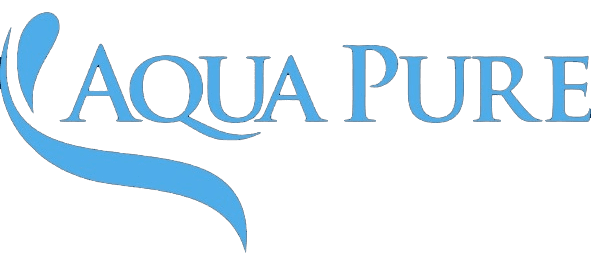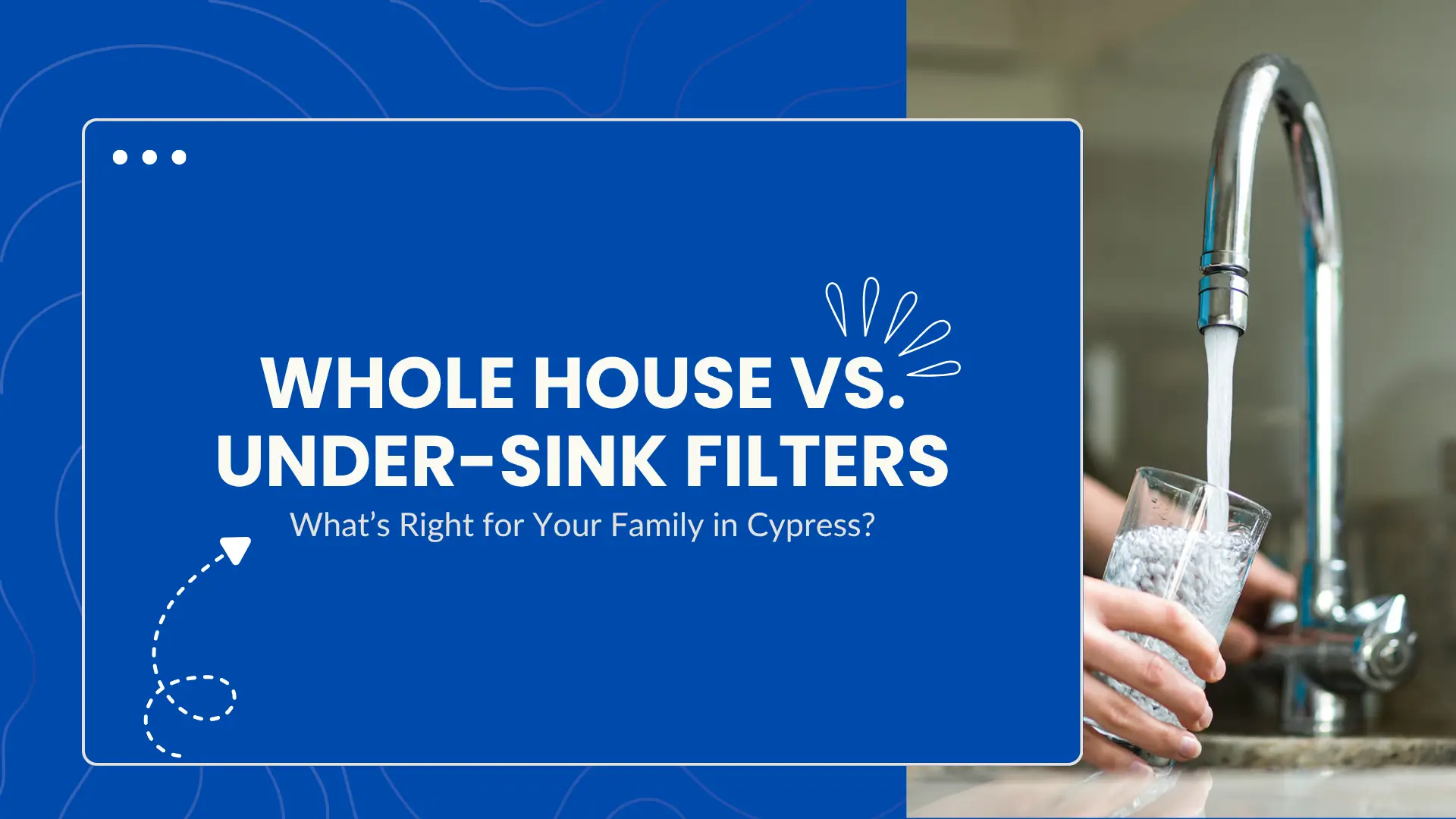If you live in Cypress or nearby Katy you’ve probably noticed your tap water doesn’t always taste or feel quite right. Maybe there’s a faint chlorine smell when you run the shower, or your dishes never look as spotless as you’d like even right out of the dishwasher. These are everyday signs of what’s actually going on in our local water supply.
When it comes to protecting your family’s health and your home’s plumbing many homeowners debate whether a whole-house water filter or an under-sink system makes the most sense. Let’s break it down together using real insights about our local Cypress water.
What’s in Cypress Tap Water?
Cypress and neighboring Katy receive water primarily from groundwater wells (like the Chicot and Evangeline aquifers) and also from the City of Houston’s surface water sources. The water meets federal safety standards, but “safe” doesn’t always mean “ideal.” Here are some of the most common concerns:
- Hard water minerals (calcium and magnesium): Cypress water is known to be moderately to very hard. This leaves scale on faucets, cloudy spots on dishes, and clogs in appliances like coffee makers and water heaters. Over time it can shorten the lifespan of your plumbing.
- Chlorine and chloramine: The city uses chlorine-based disinfectants to kill bacteria. That keeps the water microbiologically safe, but it also creates taste and odor issues. Chlorine can dry out skin and hair especially for families who shower daily.
- Sediment and rust: Local water mains are aging, and it’s not uncommon to see bits of sand, silt, or rust particles in the water especially after a line repair.
- PFAS (“forever chemicals”): While levels vary, Texas has begun monitoring PFAS compounds. These chemicals come from industrial and consumer products and are linked to health concerns at even very low concentrations.
- Lead from plumbing: While not common in the water source, older pipes or solder joints in some homes can leach trace amounts of lead.
So while Cypress water is legally “safe,” families often want extra protection and better quality for everyday use.
How These Issues Affect Daily Life
- Health: Chlorine by-products and PFAS are the most worrisome long-term. While the city ensures compliance with regulations, parents understandably want to reduce their kids’ exposure.
- Plumbing and appliances: Hard water is a silent budget killer. A water heater working harder because of scale buildup wastes energy and fails faster. Washing machines and dishwashers also need repairs sooner.
- Skin and hair: Many Cypress families complain of dry skin or brittle hair after showering. That’s usually a combo of chlorine plus hard water.
- Taste and cooking: Chlorine makes water taste like pool water. Pasta, coffee, and even soups taste better with filtered water.
Whole House vs. Under-Sink: What’s the Difference?
Both systems improve your water quality but they work at different points in your home.
Whole House Water Filters
Installed where water enters your home, these treat every drop of water: showers, sinks, laundry, and even outdoor faucets.
- Best for: Families who want protection for skin hair appliances and plumbing.
- Strengths: Removes chlorine and sediment before it flows through pipes. Helps prevent scale when combined with a softener. Provides better showers laundry and dishwashing.
- Considerations: Higher upfront cost, requires professional installation, and space in the garage or utility room.
Under-Sink Filters
Installed under your kitchen sink they treat just the water at that tap (sometimes paired with a fridge line).
- Best for: Families who mainly care about drinking and cooking water.
- Strengths: Affordable, compact, and great for renters or budget-conscious households. Removes chlorine taste odor and some contaminants depending on the filter type.
- Considerations: Doesn’t help showers or appliances. You still deal with hard water scale. Cartridges need replacement every 6–12 months.
How to Know Which You Need in Cypress
Here are some practical ways to decide:
- Check for white spots and scale: If you’re constantly scrubbing cloudy dishes or replacing heating elements, a whole-house system plus a water softener may be worth it.
- Taste test: If the biggest issue is drinking water taste, an under-sink filter might be all you need.
- Skin and hair concerns: If your family complains of dryness after showers, a whole-house chlorine filter will make a noticeable difference.
- Appliance bills: If you’ve already replaced a water heater earlier than expected, the savings from whole-house protection may outweigh the cost.
- Future plans: If you plan to live in your Cypress home long-term, whole-house systems are a solid investment.
What Cypress Families Can Do Right Now
- Get your water tested. A simple test shows hardness level, chlorine, pH, and sometimes PFAS. This is the best way to choose the right solution.
- Start small if needed. If budget is tight, begin with an under-sink filter for drinking water and add a whole-house system later.
- Consider financing. Many local families are surprised how affordable professional installation can be with $0 down or monthly payments.
- Don’t forget maintenance. Filters need replacement and softeners need salt. Choosing a company with local support helps you stay on track.
How Aquapure Helps Cypress Families
Aquapure has been Texas-owned and family-operated for over 10 years, serving homes in Cypress Katy and beyond. Here’s how they make water care stress-free:
- Free installation and certified support – so you don’t have to guess or DIY.
- Easy financing options including $0 down and Buy Now Pay Later.
- Lifetime warranty – peace of mind that your system is always protected.
- Customized solutions – no one-size-fits-all packages. Every home has unique needs.
Whether you’re ready for a whole-house system or just exploring an under-sink filter Aquapure can test your water for free and walk you through options that fit your budget.
Local FAQ: Cypress & Katy Water
Is Cypress tap water safe to drink?
Yes it meets federal standards, but many families still choose filtration to reduce chlorine, PFAS, and hard water issues that affect taste and health.
Do I really need a water softener in Cypress?
Most homes here have hard water. A softener protects water heaters, dishwashers, and laundry while making skin and hair feel softer.
How much does a system cost in Cypress?
An under-sink system can be just a few hundred dollars. Whole-house systems with installation usually run higher but with financing most families spread out the cost affordably.
What’s the first step?
Schedule a free water test. Once you know your actual numbers it’s easy to choose between an under-sink filter, whole-house system, or a combo with a softener.
Final Thoughts
Cypress families deal with unique water challenges from hard minerals to chlorine and emerging contaminants like PFAS. Choosing between a whole-house or under-sink filter depends on whether your main concern is taste and drinking water or protecting your entire home.
If you’re ready to see what’s really in your water start with a free test from Aquapure. From there you’ll have clear answers and simple solutions – with professional installation lifetime warranty and support from a trusted Texas team.



